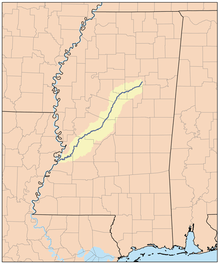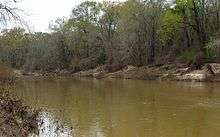Big Black River (Mississippi)
| Big Black River | |
|---|---|
 | |
| Country | United States |
| Basin | |
| Main source | Webster County, Mississippi |
| River mouth |
Mississippi River 40 feet (12 m) |
Big Black River is a river in the U.S. state of Mississippi and a tributary of the Mississippi River. Its origin (33°41′40″N 89°07′59″W / 33.6944°N 89.1331°W) is in Webster County near the town of Eupora in the north central part of the state. From there it flows 330 miles (530 km) in a generally southwest direction until it merges with the Mississippi River 25 miles (40 km) south of the city of Vicksburg.[1] It is the major contributor to the Big Black River Basin.[2] It forms the eastern border of Holmes County, the northern border of Choctaw County, and the northern border of Claiborne County.
The Big Black River and most of its tributaries are silt-filled. The rivers carry large amounts of suspended sediment, resulting mostly from agricultural runoff. These tributaries are slow-flowing muddy streams. However, some are swift-flowing with sandy bottoms.[3]
The Battle of Big Black River Bridge, fought during the Battle of Vicksburg, was part of the Vicksburg Campaign in the American Civil War.[4]
Big Black River Basin

The size of the Big Black River Basin drainage area is 3,400 square miles (8,800 km2). Its elevation varies from 50 to 650 feet (14 to 198 meters) above sea level. It is 160 miles (260 km) long and averages 22 to 25 miles wide. Most of its small tributaries are in the upper part of the basin and flow only part of the year. The terrain is hilly with 56% of the land forested and 39% used for farming and cattle ranching.[3]

Battle site
A pivotal battle between the Union and Confederate forces occurred along the Big Black River, culminating in the Siege of Vicksburg in the American Civil War in 1863. Commanded by General Ulysses S. Grant, Union forces defeated Confederate troops under General John C. Pemberton at the Battle of Champion Hill. Grant chased Pemberton, who was headed toward Vicksburg. Pemberton left 5,000 troops to make a stand on both sides of the Big Black River after his Champion Hill defeat, while he withdrew with his main command to nearby Vicksburg.[5]
See also
Notes
- ↑ The American Heritage Dictionary of the English Language, Fourth Edition copyright ©2000 by Houghton Mifflin Company
- ↑ "Big Black River Basin". Mississippi Department of Environmental Quality. Archived from the original on 23 September 2006. Retrieved 2006-10-20.
- 1 2 "The Big Black River Basin". USGS.gov. Retrieved 2006-10-20.
- ↑ "Big Black River Bridge". nps.gov. Archived from the original on 2007-08-17. Retrieved 2006-10-20.
- ↑ "Battle of Big Black River". Encyclopædia Britannica. Retrieved 2007-11-13.
External links
- "Big Black River". Geographic Names Information System. United States Geological Survey. 30 September 1980. Retrieved 2009-10-18.
- The Big Black River Basin Map
- Big Black River Bridge (Big Black)
- Map of Big Black River
- Big Black and Homochitto River Basins
- The Big Black Bridge
- Big Black River Bridge Civil War Mississippi
- Big Black River at West
- Historical Maps of Big Black River (Miss)
Coordinates: 32°03′11″N 91°03′27″W / 32.0530°N 91.0575°W